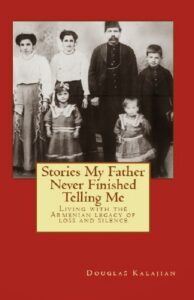I felt certain of the title the moment I decided to write
the book: Stories My Father
Never Finished Telling Me.
It represents a dilemma that will be familiar to
many Armenian-Americans born after the tumult that dislodged our parents and
grandparents from their homeland.
My
father, Nishan Kalajian, had the misfortune to be born in Diyarbakir, Turkey in
1912 at the core of the imploding Ottoman Empire. For him, the Armenian
Genocide was not a distant, historic event but the defining reality of his
life. He lost his mother, his home and everything familiar before being cast
into the world alone.
I knew that much from an early age,
but I desperately wanted to know more: How he survived, how he kept his wits
and his faith, how he moved forward without being consumed by bitterness and
hate. My father volunteered none of it. He dealt with his
most painful memories in a most Armenian way, by pushing them aside.
My
mother understood this better than anyone. She warned me never to ask him about
such things and I never did, at least not directly. But every so often when an opportunity
presented itself, I’d approach the topic obliquely and with great caution.
When he
responded at all, my father often shared only a scrap or two before changing
the subject or retreating to his books. It was left to me to figure out the
importance of each scrap, and to connect it to whatever had come before or
after. This is how my life-long conversation with my father continued, in fits
and starts, yielding scattered pieces of a puzzle that I’m still trying to
complete more than 20 years after his death.
As a
writer, I felt compelled to tell as much of my father’s story as I could
because I believe it holds important lessons. But I also wanted to tell my own
story about growing up in the shadow of a great cataclysm with a father who
would not talk about what he had experienced.
The book’s subtitle, Living With The Armenian Legacy of Loss and
Silence, conveys my challenge in learning to appreciate a complex cultural
inheritance that is rich and wondrous but also dark and painful to contemplate.
Most
important, I wrote the book for my daughter and for her generation in hopes
that they’ll figure out how to celebrate the best parts of that inheritance
while finally vanquishing the pain.
Stories is my third book, and the first
I’ve published independently. It’s available in print and as a Kindle e-book. You won’t find it at your local book shop but they can order it for you—or you can order one yourself through Amazon or other online book sellers.




View Comments
Doug's father had an amazing life -- but wouldn't discuss it! The author's search for the facts becomes part of the story and the surprises keep coming. Along the way I learned much about the history of a people too often ignored by the history textbooks. I recommend it.
I like how it depicts the everyday life of an Armenian family that both wanted to be so American but also felt very different. The story is full of Armenian food, music and culture, and how each generation saw itself in relationship to this Armenian heritage.
Sounds like a great read. But it must have been difficult to write. Very brave, Doug. I look forward to reading it!
Thanks Erin. It was a difficult, emotional task for Doug, but it was an important project for him to complete. I couldn't be prouder of him. Enjoy the book.
Nearly finished with your book. Thank you for sharing your family's story. I thoroughly enjoyed reading it and found it very educational as well.
Doug humbly thanks you!